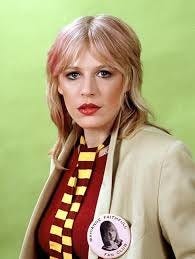You surely already knew Marianne Faithfull died in January; at the announcement, old pictures of her twinkled through social media. But of all that flew past my scrolling, this one stopped me in my (online) tracks—and I don’t think it’s just the “Quidditch spectator” getup.

I couldn’t find the full backstory of this pic, but suffice to say: I love the idea of wearing one’s own Fan Club badge, right there on one’s breast. Sure, some might see a signal of a big head, but what if it’s just a self-aware heart?
Not that self-worth is a requirement in producing great work—history is lousy with amazing artists with crippling self-doubt, some of whom lost their lives to it. In fact, it’s maybe a bit strange that one of my favorite quotes about the mental rewards of cultivating creativity is from someone who battled severe artistic anxiety (though the quote must have been from a good day).
“The most important tool the artist fashions through constant practice is the faith in his ability to produce miracles when they are needed.” —Mark Rothko
But, too, the fact that so many creatives suffer while making their art—that doesn’t make suffering a goal. It seems sometimes it seems we need to remind ourselves that art is expression; and expression doesn’t require martyrdom. Instead, I prefer another 2025 creative loss’s wisdom:
“…people might bring up Vincent van Gogh as an example of a painter who did great work in spite of—or because of—his suffering. I like to think that van Gogh would have been even more prolific and even greater if he wasn’t so restricted by the things tormenting him. I don’t think it was pain that made him so great—I think his painting brought him whatever happiness he had.” ― David Lynch
This is it, I think: some artists are able to create even while suffering (thank goodness), but the suffering itself doesn’t cause the creativity. Similarly, some artists actively dislike their work and still manage to make objectively amazing art; however, their dislike of their efforts isn’t the driver of success; instead, any success is in spite of their dislike.
As a writer, almost all my creative is on spec—tons of unpaid work (ideating, drafting, revising, revising, and revising), all in the hope I may be paid monetarily for some of the best of it at a vague future date. But you know what I can count on? Enjoying what I can of the work itself: how I change it, and how it changes me. Of seeing some concrete end results, sure (when I’m lucky)—but also seeing my growth, cheering myself on, celebrating when I keep my promises to myself. Even on the hardest creative day, realizing—it’s still a CREATIVE day, and better than most days I could have ever dreamed for myself as a ‘scared to put a toe out of line’ child. I’m here, when so many aren’t! I can sit and write, when so many can not (or will not)! It’s certainly not a bed of roses—but it’s not a bed of nails, either.
A growth mindset means working at the sometimes-bleeding edge of our ability, which means we may often feel restless—like we are tightrope walking in moonshoes. But if we allow ourselves to get uncomfortable—and work through it—we begin to believe that we’re capable of not only letting ourselves trust fall when we need to, but also of surprising ourselves with our bounceback.
Though there are many reasons it’s good to cultivate a supportive self-image of oneself as a creative, I won’t pretend it’s always easy. (I will sincerely say, from experience: therapy definitely helps.)
But—most importantly: what is the alternative? What could possibly be the benefit of NOT being your own biggest fan?
Luckily, enjoying your own work doesn’t keep you from loving others’! (Indeed, you will probably appreciate it MORE, because it will feel aspirational vs. confrontational.)
Your “conductor of my joy train (CHOO! CHOO!)” friend,
Elayne
My posts are always free, but my focus isn't; if you found this post interesting or useful, please consider ♡’ing it so I know. Thank you!




